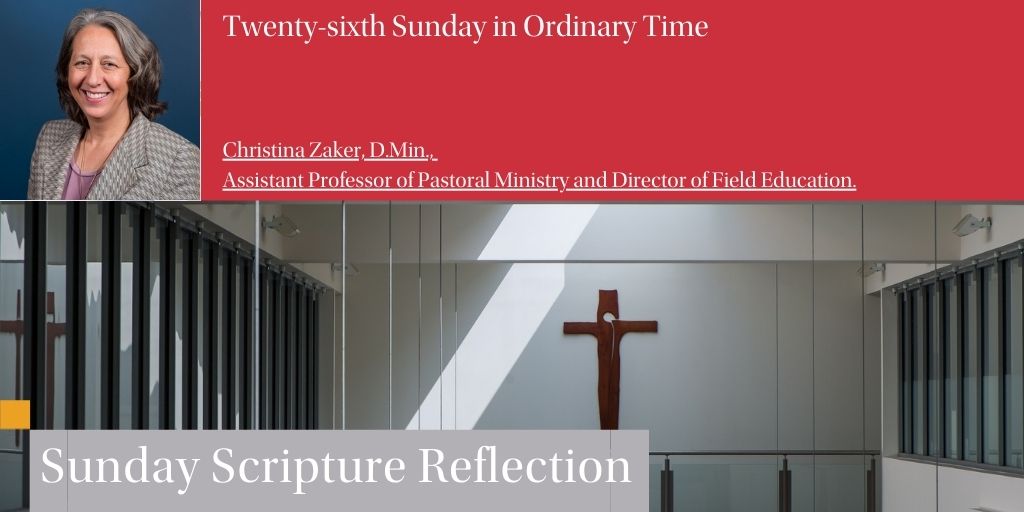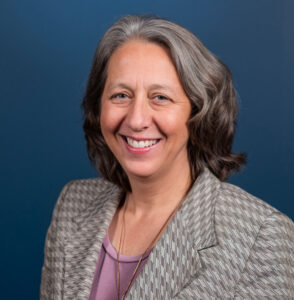

Assistant Professor of Pastoral Ministry and Director of Field Education.
Readings:
Amos 6:1a, 4-7
Psalm 146:7, 8-9, 9-10
1 Timothy 6:11-16
Luke 16:19-31
It seems today there is a lot that has us standing at huge chasms between us and those “others” with whom we do not agree. This happens on an international landscape with war and distrust being sewn at high levels, but it also happens among neighbors, family members, fellow travelers on the journey. In the Gospel parable today, we see Lazarus with Abraham on one side of huge chasm and the unnamed rich man on the other. But slipping this parable into an easy binary pitting the poor against the rich is not helpful. Abraham was a rich man and yet he sits with Lazarus. There are many people throughout scriptures who used their wealth to support Jesus’ ministry, and even poor people get sent away hungry if they have not properly dressed for the banquet, so, this isn’t about rich or poor. The chasm that lies across the center of this parable and at times across the center of our lives is not one of pitting poor against rich, or white against black, Christian against Muslim, or any other binary that can be used to divide, but rather it is a parable that pushes us to consider how we view and treat the “other,” and challenges us to recognize them as our own.
The rich man calls out to Abraham, addressing him as father. Abraham addresses him back as “my child.” So, there is evidence of a familial concern for each other. Lazarus has no voice in the conversation, but his placement in the arms of Abraham shows clearly that, he too is a child of Abraham. Perhaps the chasm remains uncrossable when the rich man looks up and asks Abraham to send Lazarus like a servant to quench his thirst. And again, when he asks Abraham to send Lazarus to warn his brothers. He does not see Lazarus as his brother – only as a servant or messenger. Perhaps the chasms that exist are too often of our own construction and we are the ones who must change enough to cross it. It is a transformation of the heart that decenters our own needs and considers the whole picture through God’s eyes. It is really hard to recognize the other as our own; to see them as a fellow child of God and to move God back into the center of how we relate to them.
It’s hard because humans are not perfect; we drive each other crazy with our needs or our mistakes or our blind spots. There are so many people who demand things from us, some legitimate and some scams. We are not being asked to answer all the needs of another, the parable is simply asking us to lift our eyes and recognize how intertwined our lives are with one another. To recognize the ways our actions impact another or our decisions have repercussions that could be very hard for others. The rich man spent a lifetime stepping over Lazarus at his gates, he must have been somewhat conscious of his presence there, because he knew him by name. But yet no actions during his life nor after, hinted that he recognized Lazarus as anything but servant and at the margins of his own story. The center of our story needs to be God – not ourselves and not a chasm.
The other readings give us some clues to the work it takes to see the other as our own. The first reading from Amos cries “Whoa to the complacent” and laments that they were like those who were unmoved by the fall of Joseph. He did not scold them for being rich, but for being indifferent to the plight of their brother.
In the Letter to Timothy, we see a series of verbs that counter that complacency: “pursue”, “compete”, “lay hold” these are the actions taken by a person of God to foster patience, gentleness, love, and righteousness. If everyone in life was easy to love, what would we need patience for?! It takes work, not complacency.
We get lost in a chasm when we lose our center. The readings today are setting before us a way of being: seeing the other as our own, actively working for our faith and recentering our devotion back on God. The God we see in others, the God we see at work in our own hearts and the God deserving of our honor and devotion.
By Christina Zaker, D.Min.,
Assistant Professor of Pastoral Ministry and Director of Field Education.